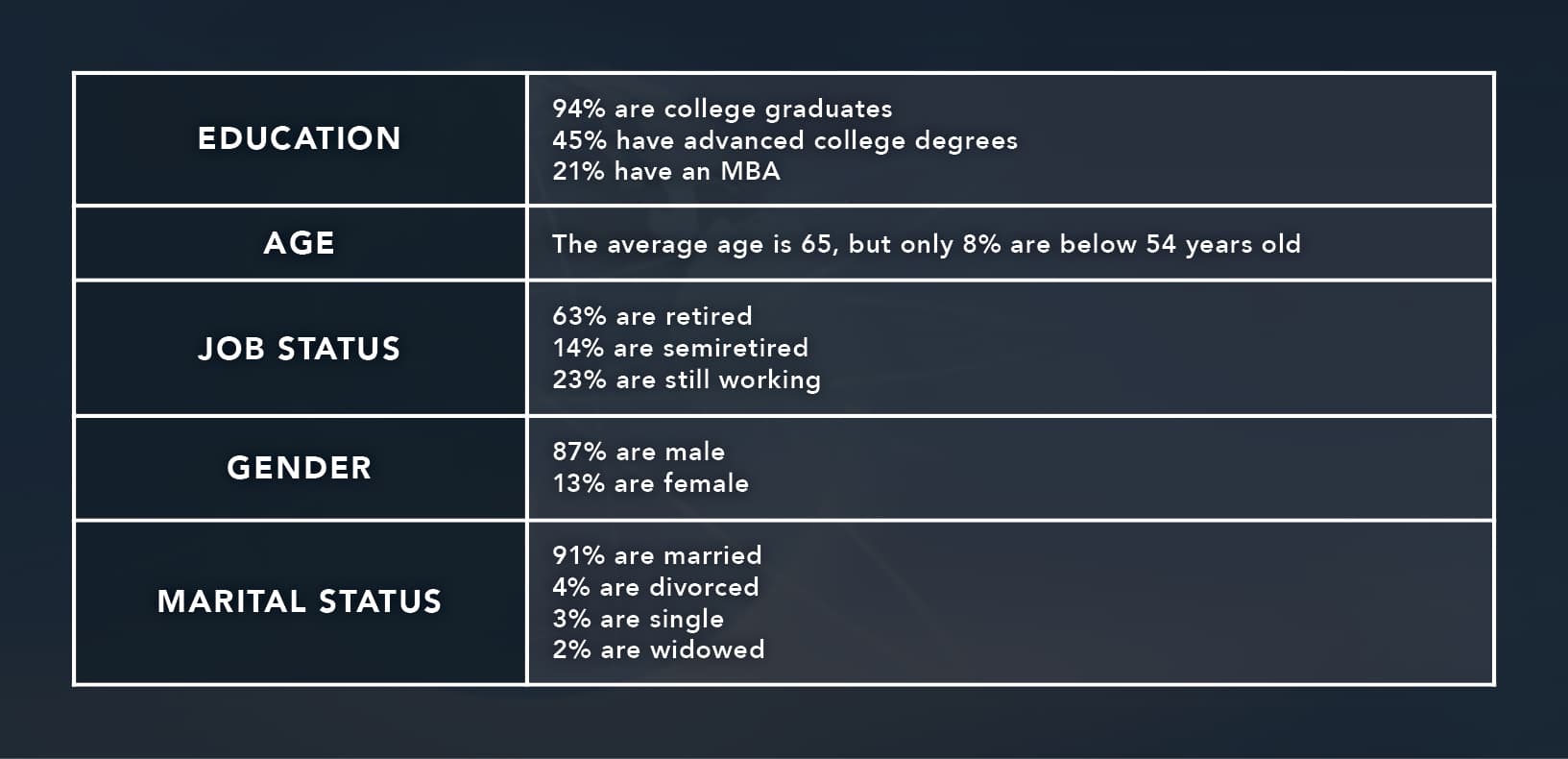What makes marketing to high-net-worth individuals, very high-net-worth individuals, and ultra-high-net-worth individuals (HNWIs, VHNWIs, and UHNWIs) such a challenge is that these elite groups of people are both like and not like those of us who have normal jobs. Now, granted, they’re more unlike the majority of us, but the similarities are worth considering.
Luxury real estate agents would do well to remind themselves every now and then that what makes us human is also what makes high-net-worth people human. I wouldn’t say they’re regular folk, but what we all have in common (like wanting to feel special) can serve as a foundation for a marketing plan that can then be modified to address what’s unique about the rich.
In this blog, I offer several top-quality real estate marketing ideas that luxury real estate agents can use to attract and retain wealthy clients. But first, as is always the case, if a marketing campaign is to produce the desired results, you need to start with knowing your audience.
Who are high-net-worth individuals?
A HNWI has more than $1 million in liquid assets; a VHNWI has a range of liquid assets valued at between $5‒$30 million; and, finally, a UHNWI is typically defined as someone with an excess of $30 million in liquid assets. For those of you not familiar with asset categories, liquid assets include those that can be quickly turned into cash, such as stocks, mutual funds, accounts receivable, certificates of deposit, tax refunds, and, of course, the cash in checking and savings accounts.
Aside from the lucky devils who have won big money playing a lottery, people with this kind of wealth have generally gotten it through some combination of hard work, inherited wealth, professional success, and smart investment choices.
A demographic profile of HNWIs, VHNWIs, and UHNWIs
On any list of high-net-worth individuals, you’ll find celebrities, business owners, sports professionals, lawyers, entrepreneurs, trendsetters and influencers, politicians, financiers, and the independently wealthy who don’t need to work.
But rapidly changing economies, emerging markets, the growth in entrepreneurship, technological innovation, and even what’s happened during and since the COVID-19 pandemic make it tough to draw clear lines among the demographic profiles of HNWIs, VHNWIs, and UHNWIs as separate groups. However, research collected from Spectrem Group and The Wealth-X and UBS World Ultra Wealth Report provides a fair representation of UHNWIs:
How do they spend their money?
According to Pillar Wealth Management in California, people with high net worth tend to enjoy traveling (New Zealand, Australia, Oceania, Europe, and Asia are popular destinations); collecting art, cars, jewelry, and watches; playing golf; attending art exhibitions; yachting; riding horses, flying private planes, and fine dining. Another study reports that these individuals are also six times more likely to shop at upscale apparel outlets, indulge in home renovations, and shop for furniture.
In short, they do the sort of things many of us would like to do but can’t afford to do.
What flies in the face of many stereotypes about wealthy people is that they have the same concerns so many of us “regular” people have. Yes, they may have lavish lifestyles, but they also want to protect their money, leave a nest egg for their kids, and help people who are less fortunate than themselves. In fact, the top hobby of wealthy women is philanthropy, and the most popular causes are education and health.
Where do they live?
Regardless of how different surveys define the geography of their US studies, it’s apparent that HNWIs enjoy large metropolitan areas, including New York City, Los Angeles, Chicago, San Francisco, Washington DC, San Jose, Seattle, and Boston.
Cities provide the wealthy with a large variety of amenities and the breadth and depth of a culturally diverse population. Many of these cities serve as financial hubs and are the primary locations of businesses owned by HNWIs, VHNWIs, and UHNWIs. Large metropolitan areas are also international travel destinations with the necessary infrastructure to support people coming and going as they please.
But smaller locations also have their appeal.
Smaller towns tend to be quieter than the big cities, are more remote, can offer more privacy, and have enough space to accommodate some of the largest mansions and expansive gardens. Included among the home addresses of those looking for a cozier locale are places like Chevy Chase, Maryland; Boca Raton, Florida; Big Sky, Montana; Jackson Hole, Wyoming; Far Hills, New Jersey; and Rhinebeck, New York.
Traits shared by the wealthy and what they mean for luxury real estate agents
While demographic information is useful, more useful is understanding your audience’s attitudes, interests, personalities, values, opinions, and lifestyles. These psychographic characteristics can often be assumed from knowing characteristics like age, gender, political affiliation, and the like, which you can (and should) verify with a bit of research.
Once you have this information—and the data above is a start—you’ll be in a better position to create an innovative direct mail campaign, social media campaign, or another marketing effort that will pull the right emotional triggers and move your audience toward action.
Though broad-stroke descriptions are always to be taken with a grain of salt, they do serve as helpful starting points when characterizing large groups of people. Still, they’re no substitute for knowing your specific clients, which is a significant part of your job as a luxury real estate agent.
What follows are general descriptions of the wealthy as compiled by three reputable sources. Along the way, I pepper in some implications that these traits and behaviors have for working with high-net-worth people. After that, I suggest several principles you can use to square your marketing plan with the implications relevant to your sphere. Finally, I offer three top-quality luxury real estate marketing ideas to garner what is arguably the most effective source of leads coveted by real estate agents.
CNNMoney spoke with several wealth experts to ask if their VHNWI clients shared any traits. They did.
A cadre of financial professionals, wealth managers, and related experts described their clients as business owners with entrepreneurial mindsets, high-net-worth investors who are risk-tolerant but not impulsive, and:
Busy, busy, busy. The cofounder of one financial management firm reported that his VHNWI clients work exceptionally long hours and that 60- to 80-hour workweeks are not unusual. Neither are working vacations. Any professional, including real estate agents, working with this population should know not to waste their time.
Energetic. James Gottfurcht is recognized around the world as a clinical psychologist, a wealth consultant, and the president of Psychology of Money Consultants in Los Angeles. He notes that the rich most often do not require a lot of sleep and enjoy an upbeat attitude.
Kristen Armstrong, another psychologist and strategic wealth coach, referred to many of her clients as “force[s] of nature” who will focus their efforts and energy to make their visions a reality.
Agents should be willing to work just as hard to find your high-net-worth clients their perfect domicile.
Confident. I suppose there is no point in being a visionary and striving to achieve your goals if you weren’t confident that you could reach them! VHNWIs are creative about how they achieve what they want, have the attitude that they can do anything, and have confidence not only in themselves but also in others.
However, on the flip side, Gottfurcht also revealed that VHNWIs “think they’re special, ‘require excessive admiration,’ have a high sense of entitlement[,] and lack empathy for others.”
I’m sure we’ve all encountered people not counted among the wealthy that bear a resemblance to this description! Regardless, it’s incumbent upon luxury agents to be positive, remain optimistic, and not allow inconsiderate comments, actions, or criticisms to thwart their efforts to find exactly what their clients want.
Astute. The smartest wealthy people know they’re not the smartest person in the room, so they surround themselves with people who are intelligent and can help them realize their visions. You’ll often find these people in partnerships with others who help them to grow and transform their businesses.
Agents must be thorough experts in all things real estate. Working with wealthy clients means having extensive and perhaps exclusive knowledge of the neighborhoods clients desire to live in, an understanding of the market beyond what the average homebuyer might want, and an ability to anticipate problems and quickly and efficiently sidestep or solve them.
Unpretentious. Stereotypes would have us believe that all multimillionaires revel in movielike glitz and glamour, but the truth is most exceptionally wealthy people don’t keep upgrading their lifestyles to keep pace with their livelihoods. Luxury agents should listen carefully to their clients and gather as much detailed information as possible about their clients’ lifestyles and preferences.
Nielsen published its insights about and suggested ways to engage with the upper crust.
If you aim to persuade HNWIs that your promises of premium quality and service are to be believed, then you’ll need to do more . . . a lot more . . . than charge premium prices for feigned superiority.
HNWIs know the genuine article when they see it because they’re constantly exposed to premium brands, and their own experiences will set the standards. The advice from Nielsen is to “embed in your value proposition a set of unique features or propositions that create and convey . . . exclusivity at all times.”
Another consideration is, while your clients are going to be the ones living in the homes you eventually find or sell to them, they may not be the ones viewing the homes—at least not initially. It’s not unusual for family offices, assistants, or other trusted advisors to screen potential properties, so it’s important to know your clients’ decision-making processes “to ensure the right effort is being made in the right places.”
While HNWIs may have money to spend, they don’t habitually make spontaneous purchases. Like regular folk, they want value for their money too. That’s why you need to justify price based on a property’s material and emotional benefits whether it’s the location, size, features, history, or something else.
A fourth insight reflects what we know about the values, beliefs, and motives of the wealthy.
HNWIs show concern for the impact of their purchases, such as whether their choice of coffee is supporting rainforest preservation and their wine at dinner is in line with fair-trade practices. Similarly, their choice of brands is influenced by whether a company’s values align with their own.
For the luxury real estate agent, it’s essential that you understand what’s important to your clients and whether you need to scout for eco-friendly homes with the latest energy-saving smart devices or homes that provide easy access to organic farmers markets and pesticide-free dog parks.
Coldwell Banker published a report about millennial millionaires to “help luxury real estate professionals better understand this influential group of current and future homebuyers.”
In 2019, Coldwell Banker’s annual report stated there were 618,000 millionaire millennials in the US ranging in age from 23 to 37 whose net worth was between $1 million and $2.49 million. This group is poised to inherit about $68 million from their baby boomer parents so that by 2030, they’ll be five times wealthier. Additionally, there will be more who, if they’re not rich now, will be.
What’s perhaps most interesting from an agent’s point of view is millionaire millennials see investing in real estate as essential to building wealth. In 2019, on average, each owned three properties. It seems younger HNWIs fully understand the benefits of property ownership, including the tax advantages, positive cash flow, and appreciation of home values.
A few more descriptions may help you ask the right questions and select appropriate properties to show. For example, younger millionaires marry earlier than their five- and six-figure counterparts and typically have one child.
They have plenty of varied interests but are heavily into technology, health, and fitness. Their interest in technology means they expect a lot of smart-home appliances and operations; whereas for health, fitness, and (one can assume) a general desire for convenience means they prefer to be able to walk to work, recreation, spas, fitness centers, and restaurants, which makes a property’s location a key consideration. And with only one child, they’re willing to give up square footage to get a spot in the right neighborhood.
Lastly, while the wealthy feel a responsibility to give back, 56% of millennial millionaires donate to charity as compared to 35% of their older peers.
How to market to high-net-worth individuals
Admittedly, this is a lot of information to distill into an overall marketing strategy for your luxury real estate business, but when marketing to high-net-worth individuals you can use three foundational principles to inform your plan.
1. Include values and attributes they respect
One of the most important principles to remember is that you are your brand. As one writer put it, “A brand is a promise, and your company doesn’t make promises—you do.” So what should you be promising as part of your brand? Well, some of the very same things you promise all your clients—except they’re especially vital to relationships you form with HNWI clients:
- Intelligent expertise: Demonstrate that you are a professional who knows the luxury real estate market not only in your area but also in other locations that are popular among this group of buyers. Remember that these clients often have more than one property.
- Bespoke service: I can’t emphasize enough that these clients are used to customized services and products that aren’t available to the average Joe. Showcase your specialized services. AltaStreet Financial Websites advocates that wealth managers and advisors present themselves as reliable and available at all times and as willing to listen and understand exactly what their HNWI clients need. Luxury real estate agents would do well to follow the same advice.
- Discretion and integrity: Demonstrate that you respect their privacy and that you can be trusted with their business. Don’t share details with anyone except on a need-to-know basis, and always deliver on your promises.
2. Create a referral-worthy client experience
Creating an exceptional customer experience is especially important for the luxury real estate agent. While the majority (70%+) of homebuyers and sellers hire the first agent they contact, HNWIs who are willing to spend millions of dollars for a home are going to attract a much larger assortment of agents who will want to compete for the listing. You’re going to need to find a way to stand out.
- Provide oodles of information. HNWIs are as active on social media and the internet as anyone else, and before making a decision they’re going to do their research. You can demonstrate your expertise and commitment to your clients’ best interests by providing in-depth, useful information in the form of blog posts, content (like ebooks, webinars, etc.), and emails and newsletters to your list. Post materials to your website, to social media (especially LinkedIn), and well-known publications read by your base of clients.
- Solve problems. The best agents make the lives of their wealthy clients easier and anticipate and address problems even before they arise. You can add value by offering your clients a network of reliable professionals. Schedule their home inspections, and call upon the electricians, plumbers, painters, workers, and other remodeling experts you trust. Be there to walk these service providers through the home and to accept and vet the bids or provide them to someone whose job that is. You’ll build up the bonds between yourself and your clients as well as strengthen your relationships with your list of contractors.
- Make your clients feel special. This is a no-brainer. In the highly competitive world of luxury real estate, you must care for every client as if they were your only client. You’ll need to find ways to show your clients that you know just as much about them as you do about your best friend. As a simple example, don’t just bring a cup of coffee to a meeting—bring their favorite java brand that is brewed, mixed, or otherwise concocted the way they best like it. Treat each client as an individual, and you’ll be appreciated above those who do not.
3. Invest in superior marketing
Rob Jensen is the president of Rob Jensen Company, a real estate company in Nevada specializing in guarded and gated communities. About advertising in the luxury real estate market, he wrote, “The quality of the marketing needs to meet or exceed the quality of the property.”
That’s good advice.
While marketing should not be confused with your branding, marketing communicates your brand in ways you want it to be perceived. Just like you can immediately tell the difference between Cartier and Timex, your prospects, leads, and clients can tell the difference too.
AltaStreet Financial Websites explains to its clients, “They’ll [HNWIs] be able to easily tell whether something’s been quickly thrown together, or properly planned and laid out by experts. Everything about your brand has to look high quality if you want to stand out and make a good impression.”
This is why you’d be wise to hire marketing experts to ensure your collateral is well-designed and your brand is well-positioned.
Marketing professionals will have the account managers, designers, writers, photographers, digital marketers, and social media experts with the knowledge and expertise to help you clarify your goals. They’ll create and place your marketing where it will have the most impact. Furthermore, they should be able to provide you with reports that will tell you how well your marketing is performing.
Select marketing ideas that will tap the wellspring of luxury real estate marketing leads
As you can probably imagine, the rich, very rich, and megarich are constantly approached by people trying to get their business. Week after week, they and their hired assistants are awash in proposals, solicitations, and requests for meetings. What mere tactic, you might ask, can single you out from the multitude and get you through the solid mahogany door?
There’s just one . . .
To get the attention of the wealthy, you need to have your message come from someone already on the inside, someone they trust, and someone who is willing to give you a referral.
Clients of this caliber are not going to do business with just anyone, which is why other luxury agents will tell you that 99.99% of their clients were first introduced to them either through reputation or referrals.
James Pollard, writer of “The Advisor Coach,” explains that financial advisors (and by extension, luxury agents) who work with high-end clients may find it difficult to get clients on their own; however:
[O]nce you’ve found a few, you have a solid gateway to quality introductions. Here’s why: HNW individuals tend to stick together. They live in each other’s communities, vacation in similar venues[,] and attend the same social events . . . If someone with a net worth of $25 million tells a friend with a net worth [of] $3 million to use your services, for instance, the person with a lower net worth is likely to listen.
Now that you have some vital information about the people who inhabit the luxury real estate market and know that the best way to find clients is through the trusted advice of their peers, this final section describes three marketing ideas that will help you win over luxury clients and earn yourself well-deserved, lucrative referrals.
1. Event marketing
Few marketing ideas are as effective at showing gratitude and garnering potential leads as an exclusive, well-organized client-appreciation event.
Mark Minor is a financial advisor who hosts golf outings and other events—some of which are to express appreciation, while others are “bring a guest” gatherings intended to encourage referrals. At the time of his Stay Paid interview, during which he shares the precise details of his planning and follow-up processes, Mark had built a $500 million book of business primarily through referrals.
Another event is what Tom Ferry calls a “mega open house.” Rob Jensen (mentioned above) presented one of these events at a client’s home and then wrote an engaging account on LinkedIn describing the opulent affair and what went into organizing it. His case study illustrates the lavish levels such an event must reach if you’re going to make the sort of impression that causes attendees to demand the same exacting attention to detail when they hire you list their homes.
2. Direct mail advertising
Unlike the typical homebuyer, luxury clients are rarely in a rush to purchase a new home. They already live somewhere fabulous and can rent a luxury condo if necessary. This situation creates a problem for agents who somehow need to find a way to stay top of mind during the unhurried search.
This is where a personally branded, high-quality publication can be a godsend.
A publication that features your name, business, and contact information and automatically arrives at your clients’ homes every two months, will keep you in their line of sight as it sits on a coffee table, end table, or kitchen table. Everyone who enters your clients’ homes will be drawn to the gorgeous covers, and many will ask, as they flip through its pages, about who’s featured on the cover. The response can sound something like this . . .
Oh, that’s my real estate agent. Isn’t it a lovely magazine? They included a personal letter to me on the inside cover, which I thought was so nice. Would you like to borrow it? I can give you one of the tear-out cards that are inside. Their contact info is on it.
Articles about art, design, travel, home and garden, food, health and wellness, decorating, and business offer superior entertainment and information to fit a wide range of luxury interests, tastes, and needs.
Download a sample of any of our four high-gloss, personally branded magazines and admire the quality for yourself.
3. Relationship marketing
I certainly don’t need to tell you that nurturing and building strong relationships is at the heart of the luxury real estate business. And relationship marketing, the heart and soul of which is to build relationships over time by providing value, is tailor-made for luxury agents.
When you provide value to your clients before asking for anything in return, such as when you provide information they may need or can use, or solve a problem before being asked, or make an important introduction, or support their favorite charity, or bestow even a small but best-in-kind gift, you activate a natural response in them to reciprocate. They want to return your kindness or favor. And, of course, the best way they can do that is to introduce you to a friend or colleague.
The takeaway
When courting HNWI, VHNWI, and UHNWI prospects and clients, remember that they have the same feelings and concerns we all have, but, as a group, they also have some fairly unique traits and behaviors.
They are savvy consumers. They value quality and will pay for it. They are accustomed to being received and treated with deference. Their expectations of service are high. And they are drawn to the rare and exclusive.
Younger members of their rank invest in real estate as a means of growing their wealth. The hallmark of their status is exhibited in their socially conscious, ecologically responsible purchasing power. They embrace technology in all its forms. And they are generous to the causes they support.
You’ll need to provide an exceptional client experience to attract their attention. Your value proposition must radiate singular, unique, special, unusual, restricted, uncommon, one-of-a-kind service. Everything you do—including your marketing—must reflect superior quality, exacting detail, and flawless execution.
They’ll look first to work with agents others have recommended to them. When working with high-net-worth clients, strive to show you appreciate their business and the trust they place in you. Respect their privacy, act with discretion, and always keep your promises. Provide exceptional service, and you’ll be entitled to their introductions, recommendations, and referrals.












































